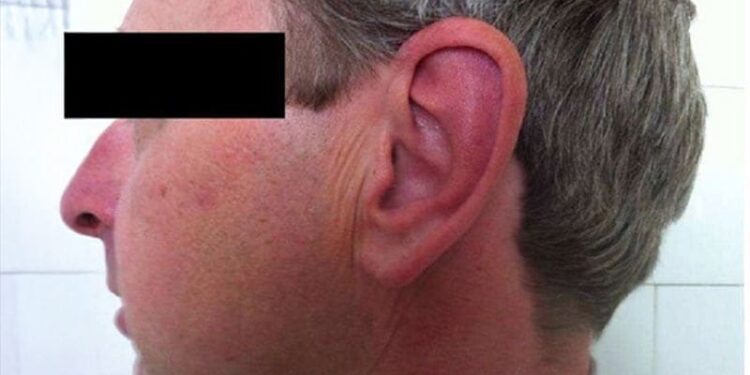TOPLINE:
A large multicenter prospective cohort study has expanded “the understanding of the range of manifestations of disease in patients with relapsing polychondritis [RP]” — particularly involving the ear, nose, throat, and musculoskeletal systems — as well as a high prevalence of organ damage, near-universal use of glucocorticoids, and frequent use of additional nonbiologic or biologic immunomodulatory therapies.
METHODOLOGY:
- Researchers conducted a multicenter cohort study between 2017 and 2023 to evaluate clinical manifestations, treatment approaches, and the association between them in 195 patients with RP (median age, 48 years; 85.6% women).
- A diagnosis of RP was confirmed using comprehensive laboratory, radiographic, and other tests; all participants tested negative for proteinase 3 and myeloperoxidase.
- Data on clinical manifestations, organ damage, and medication history were collected at baseline study visits using standardized case report forms.
- Patients were grouped by treatment: Group 1 received glucocorticoids or no drugs, group 2 received nonbiologic immunosuppressive drugs (excluding JAK inhibitors) with or without glucocorticoids, and group 3 received JAK inhibitors or biologic drugs with or without nonbiologic immunosuppressives or glucocorticoids.
TAKEAWAY:
- All patients presented with at least three clinical manifestations of RP, with a median of 11 manifestations per patient; all showed ear, nose, or airway involvement, and 83% had musculoskeletal manifestations.
- A substantial portion of patients (41%) developed organ damage, including sensorineural hearing loss (25%), auricular and saddle nose deformities (12% each), and subglottic stenosis (9%); among those who underwent dynamic CT of the chest, 31% had tracheomalacia, and 20% had bronchomalacia.
- Treatment groups 1, 2, and 3 comprised 19%, 28%, and 53% of patients, respectively; most patients (95%) received glucocorticoids, and a substantial proportion (81%) received additional immunomodulatory treatments.
- Patients in treatment group 3 had the highest rate of organ damage (62% vs 22% in group 2 and 15% in group 1) and were more likely to have arthritis and stenosis, whereas those in group 1 were less likely to experience nose pain.
IN PRACTICE:
“Standardized assessment of disease activity is warranted for patients with RP for early detection and timely initiation of treatment. These findings also highlight the absence of a consensus approach to treatment for patients with RP and underscore the need for clinical trials and treatment guidelines in this disease to help reduce the enormous burden of disease for patients,” the authors wrote.
SOURCE:
This study was led by Roger Yang, MD, University of Pennsylvania, Philadelphia, and University of Montreal, Montreal, Quebec, Canada. It was published online on May 20, 2025, in ACR Open Rheumatology.
LIMITATIONS:
This study did not capture data on dose and duration of immunomodulatory medications or clinical features at treatment decisions. Treatment choices were made independently by clinicians and may have been influenced by factors such as drug availability or insurance, introducing variability. Moreover, the academic referral setting may have contributed to selection bias.
DISCLOSURES:
Two authors reported receiving support from the Vasculitis Clinical Research Consortium, Association des médecins rhumatologues du Québec, Institute for Translational Medicine and Therapeutics, and other sources. This research was also supported by the Relapsing Polychondritis Foundation and other generous donors to the Penn Relapsing Polychondritis Program.
This article was created using several editorial tools, including AI, as part of the process. Human editors reviewed this content before publication.
Source link : https://www.medscape.com/viewarticle/enormous-burden-disease-cataloged-patients-relapsing-2025a1000fa1?src=rss
Author :
Publish date : 2025-06-06 09:50:00
Copyright for syndicated content belongs to the linked Source.














